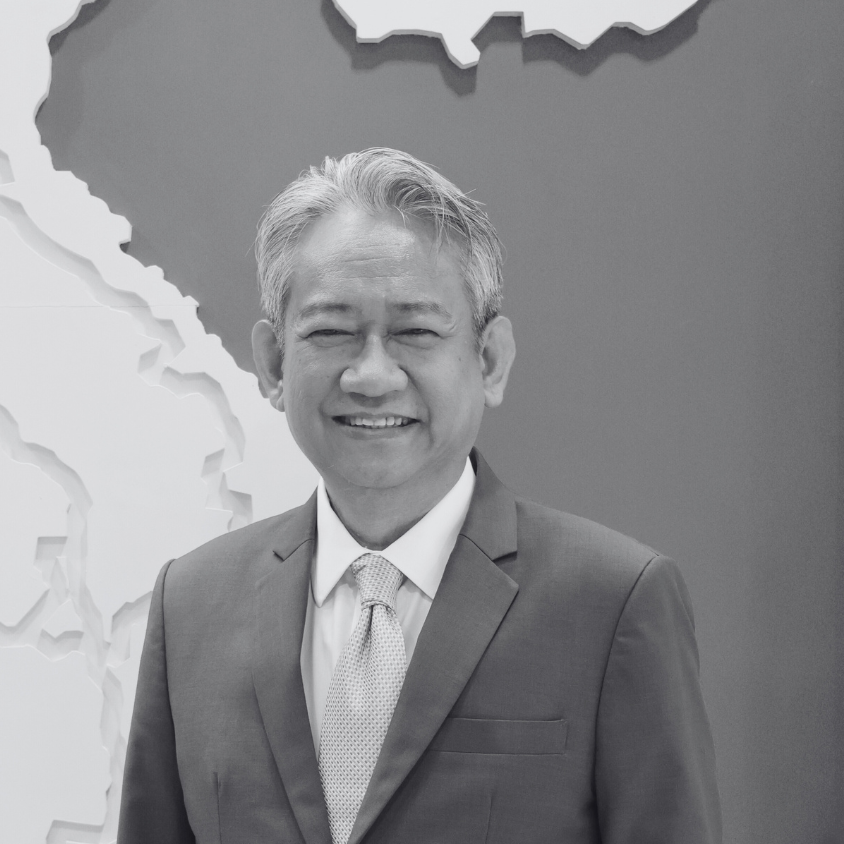

Thailand
2025
Advancing ambition: Driving change for a resilient and sustainable economy

September 30, 2025

UOB Plaza Bangkok Building
Thailand

Thailand

September 30, 2025

UOB Plaza Bangkok Building

500 THB (Access to morning masterclass and afternoon conference)

Register for tickets
Financing Thailand's transition: Integrating climate risks and opportunities
A half-day masterclass workshop by Eco-Business ESG Intelligence and UN Environment Programme Finance Initiative
Time: 9am - 12pm (Penthouse, 30th storey)
Synopsis
Thailand’s transition to a low-carbon and climate-resilient economy presents both pressing risks and emerging opportunities for businesses and investors. This exclusive half-day masterclass by Eco-Business ESG Intelligence, in partnership with the United Nations Environment Programme Finance Initiative, will equip participants with the tools to understand and evaluate the impacts of climate change across the financial sector and the real economy. It will explore how climate risks can be assessed and embedded into risk-management frameworks and highlight the opportunities arising from sustainable finance.
Through practical insights and case study examples from around Asia, this accredited masterclass will guide participants on integrating climate considerations into decision-making processes to strengthen resilience, enhance competitiveness, and align with Thailand’s climate targets.
What participants will learn:
▪️ The science behind climate change and its implications for Thailand’s economy and financial system
▪️ The role of net zero commitments, including decarbonisation strategies and transition pathways, in shaping business and investment decisions
▪️ Practical approaches for integrating climate considerations into corporate and financial decision-making frameworks
Advancing ambition: Driving change for a resilient and sustainable economy
Thailand edition of Unlocking capital for sustainability 2025, Eco-Business’ flagship sustainable finance summit in partnership with the UN Environment Programme Finance Initiative
Time: 2pm - 6pm (Auditorium, 5th storey)
Synopsis
Thailand is confronting the realities of a changing climate after another year of record-breaking heatwaves, heavy rainfall and widespread flooding. In response, the country has set a target of achieving a net zero economy by 2065 to address climate change but also to secure long-term, sustainable economic growth.
While the Asean giant has made significant progress – from pledges to generate half of all domestic energy needs from renewables under the Power Development Plan, to the release of a sustainable finance taxonomy and a draft Climate Change Act, critical challenges remain.
A widening funding gap on climate adaptation needs and available finance threatens the country’s economic resilience, with projected climate-related damages potentially reaching US$553 billion by 2050. The stakes are especially high for rural and agriculture-dependent communities, where droughts, floods and crop failures put livelihoods — and food security — at risk. Mobilising sustainable finance for adaptation is therefore not just necessary but urgent.
Meanwhile, domestic companies face significant hurdles to decarbonisation. Many struggle to tackle emissions across their full value chains or to access the technologies and capital required to scale solutions. Beyond carbon, nature-related challenges such as biodiversity loss and water stress are fast emerging as material risks to business operations, demanding new approaches to resilience and competitiveness.
How can Thai companies access the finance and technologies necessary to decarbonise their supply chains? What role can government, business and communities play in co-creating climate resilience strategies at scale?
Join us for Unlocking capital for sustainability Thailand as key leaders gather to determine the solutions to advance the country’s transition to a resilient, low carbon and sustainable economy.
What we're talking about
Key Speakers
Speakers
Dr. Thanyaporn Krichtitayawuth
Executive Director, UN Global Compact Network Thailand
Krichtitayawuth
Speaking on:


Somruedee Chaimongkol
Senior Executive Officer & Former CEO, Banpu Public Company Limited
Chaimongkol
Speaking on:


Niran Nirannoot
National Project Manager, Biodiversity Finance Initiative (BIOFIN), UNDP Thailand
Nirannoot
Speaking on:


Carlota Gómez Tapia
Climate Mitigation & Net Zero Coordinator for Asia Pacific, United Nations Environment Programme - Finance Initiative (UNEP-FI)
Tapia
Speaking on:


Tanita Sirisup
Senior Executive Investment Advisor, Thailand Board of Investment (BOI)
Sirisup
Speaking on:


Dr Winston Chow
Co-Chair, Working Group II, Intergovernmental Panel on Climate Change (IPCC) and Professor of Urban Climate, Singapore Management University
Chow
Speaking on:


Julian Tost
Deputy Cluster Coordinator Agriculture and Food, Thailand, Deutsche Gesellschaft für Internationale Zusammenarbeit (GIZ) GmbH
Tost
Speaking on:


Kate Lazarus
Senior Environment, Social and Governance (ESG) Advisory Lead for Asia Pacific, International Finance Corporation (IFC)
Lazarus
Speaking on:


Chaiyaporn Chulacharitta
Managing Consultant, Corporate Sustainability & Climate Change, ERM
Chulacharitta
Speaking on:


Agenda
9:15
Climate change fundamentals, with an eye on Thailand and ASEAN
9:40
Transition to Net Zero: Financing opportunities in the energy supply and demand market in Southeast Asia and Thailand
10:25
Climate risks and opportunities, with spotlight on the role of the finance sector
11:10
Panel discussion & knowledge sharing — Financing Thailand's transition: Integrating climate risks and opportunities
This panel explores how Thailand can finance its climate transition, examining physical and transition risks, emerging opportunities, and how financial institutions and real economy leaders can collaborate to unlock capital, resilience, and sustainable growth.
Speakers
14:00
14:10
Opening keynote by guest-of-honour
14:25
Opening plenary – Beyond finance: Activating supply chains for net zero
Decarbonising corporate supply chains has emerged as a strategic priority to advance Thailand’s net zero ambitions. Major pillars of its economy such as manufacturing, agribusiness and logistics are under growing pressure to reduce emissions by accelerating the adoption of clean energy, green fuels and digital traceability across their value chains.
Thailand’s evolving regulatory landscape – including a sustainable finance taxonomy issued in May covering 97 per cent of GHG-emitting activities – is already driving innovation across key industries.
Yet, while progress is evident, scaling decarbonisation across supply chains remains challenging due to fragmentation, high costs and uneven stakeholder commitment. Unlocking new financing structures, public–private partnerships and breakthrough technologies will thus be critical to accelerate momentum.
What untapped opportunities exist in supply chain networks to accelerate decarbonisation and overcome these challenges? How can companies turn supply chain sustainability into a competitive advantage?
Join key decision-makers as they tackle these questions and more, determining actionable solutions to decarbonise corporate supply chains.
Speakers
15:30
Plenary 2 – From risk to resilience: Embedding nature into business strategy
Over half of the world’s GDP – equivalent to approximately US$58 trillion – is dependent on nature and nature-related services. Rapid biodiversity loss is thus posing serious risks to economic growth and business continuity.
In response, companies are increasingly integrating nature into corporate strategy to build long-term resilience of their organisations. Thailand’s National Biodiversity Action Plan 2023–2027 also aims to strengthen public-private collaboration on minimising biodiversity loss – from sustainable resource use to capacity building.
Corporate ESG disclosure will have to recognise the growing materiality of nature on business – both to navigate emerging risks and leverage green and biodiversity finance.
Are companies aware and equipped to deal with nature-related risks? What tools can they utilise to assess and mitigate these risks? And how do they go beyond risk management to turn these risks into opportunities?
Join key stakeholders as they explore the solutions that will future-proof businesses and drive a nature-positive economy.
16:20
Closing plenary – From crisis to resilience: Scaling climate adaptation in Thailand
Thailand faces mounting climate risks, with rising temperatures, chronic floods and worsening droughts threatening agriculture, coastal zones and vulnerable communities. Building resilience is no longer optional — it is key to safeguarding livelihoods, ecosystems and local economies.
Thailand’s revised Climate Change Master Plan (2023–2027) places equity at its heart, with gender-responsive adaptation measures. Public–private partnerships are driving early warning systems, nature-based solutions and sustainable water management projects across the nation.
Yet, the challenge remains: how can Thailand build adaptive systems that not only protect ecosystems but also secure the livelihoods and economies that depend on them?
How can government, business and communities co-create adaptation strategies with real impact at scale? What mechanisms will ensure long-term finance flows into climate adaptation?
This closing plenary will explore the innovative solutions needed to futureproof communities, economies, and ecosystems against climate risks.
Speakers
17:10
Closing keynote address
17:20
Partners
In partnership with
Strategic partner

Visit website
UOB
United Overseas Bank Limited (UOB) is a leading bank in Asia with a global network of about 500 branches and offices in 19 countries and territories in Asia Pacific, Europe and North America. We believe in being a responsible financial services provider and we are committed to making a difference in the communities in which we operate.
Find out more
Knowledge partner

Visit website
UN Global Compact Network Thailand (UNGCNT)
UN Global Compact Network Thailand (UNGCNT) was officially launched in December 2018, by 15 companies as the founding members.We are the local network of the United Nations Global Compact (UNGC), the world's largest corporate sustainability initiative. Arose from the needs for peer-to-peer support and cooperation in order to meet the global standards for corporate responsibility. We help member companies of all sizes, from all sectors, in cutting through complexity throughout their sustainability journey.
Find out more
Outreach partners

Visit website
Asia Investor Group on Climate Change (AIGCC)
Asia Investor Group on Climate Change (AIGCC) is an initiative to create awareness and encourage action among Asia’s asset owners and asset managers about the risks and opportunities associated with climate change and low-carbon investing.
Find out more

Visit website
Asia Clean Energy Partners
Asia Clean Energy Partners is an international consultancy that supports the design and scale-up of effective clean energy initiatives. We provide services in the area of market and policy research; program design and support, project coaching and preparation; mobilization of financial resources for climate and clean energy projects; and communications, network development, and convening.
Find out more

Visit website
Climate Finance Network Thailand (CFNT)
Climate Finance Network Thailand (CFNT) is a Bangkok-based think tank established in 2024. Its mission is to integrate climate considerations into Thailand’s financial system, in promotion of sustainable financial practices and driving the country’s transition towards a resilient low-carbon economy. CFNT collaborates with a diverse range of stakeholders—including financial institutions, investors, regulators, policymakers, and civil society—to create actionable insights, innovative mechanisms, and stronger partnerships that address the challenges and opportunities of climate change action.
Find out more

Visit website
Asia Pacific Loan Market Association (APLMA)
The Asia Pacific Loan Market Association (APLMA) represents the interests of institutions active in the Asia-Pacific syndicated loan markets. The association’s primary objective is to promote growth, liquidity and best practice in these markets.
Find out more

















.png)
.png)
.png)
